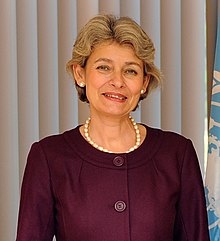This biographical article is written like a résumé. (May 2021) |
Irina Bokova | |
|---|---|
Ирина Бокова | |
 Bokova in 2009 | |
| 10th Director-General of UNESCO | |
| In office 15 October 2009 – 10 November 2017 | |
| Deputy | Getachew Engida |
| Preceded by | Kōichirō Matsuura |
| Succeeded by | Audrey Azoulay |
| Minister of Foreign Affairs Acting | |
| In office 13 November 1996 – 13 February 1997 | |
| Prime Minister | Zhan Videnov |
| Preceded by | Georgi Pirinski |
| Succeeded by | Stoyan Stalev |
| Personal details | |
| Born | 12 July 1952 Sofia, People's Republic of Bulgaria |
| Spouse | Kalin Mitrev |
| Alma mater | Moscow State Institute of International Relations |
| Signature |  |
| Website | Official biography |
Irina Georgieva Bokova (Bulgarian: Ирина Георгиева Бокова; born 12 July 1952) is a Bulgarian politician and a former Director-General of UNESCO (2009–2017).[1][2] During her political and diplomatic career in Bulgaria, she served, among others, two terms as a member of the National parliament, and deputy minister of foreign affairs and minister of foreign affairs ad interim under Prime Minister Zhan Videnov. She also served as Bulgaria's ambassador to France and to Monaco, and was Bulgaria's Permanent Delegate to UNESCO. Bokova was also the personal representative of Bulgaria's president to the Organisation internationale de la Francophonie (2005–2009).[3]
On 15 November 2009, she took office[4] as the ninth Director-General of UNESCO, marking two firsts: she became both the first female and the first Southeastern European to head the agency. At UNESCO, Bokova advocated for gender equality, improved education and preventing funding for terrorism, especially by enforcing the protection of intellectual goods. A firm opponent of racism and anti-Semitism, Director-General Bokova led UNESCO's activities on Holocaust remembrance.
- ^ "Directors-General | United Nations Educational, Scientific and Cultural Organization". www.unesco.org. Retrieved 8 March 2018.
- ^ "Director-General, Audrey Azoulay". UNESCO. 13 November 2017. Retrieved 8 March 2018.
- ^ Biography. unesco.org. Retrieved 21 July 2016
- ^ UNESCO. "Irina Bokova takes office as Director-General". UNESCO. Retrieved 14 March 2016.